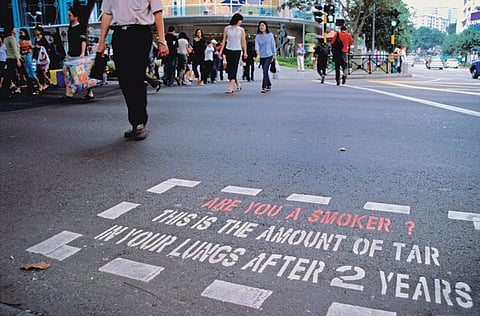Passport to health
Providing cutting-edge and affordable health care, Singapore has become Asia's leading medical hub

Safe and trustworthy clinical facilities, affordable prices and good customer service make Singapore a patient's first choice, according to SingaporeMedicine, a multi-agency government initiative led by the country's Ministry of Health. English is used as the administrative language in the city-state and the infrastructure, culture and people help to make what can be a difficult time more comfortable and easy on both patients and their accompanying friends or family.
One family from the UAE found going to Singapore for treatment a positive experience. "Public transport in Singapore was so > efficient that travelling was a breeze," says Khalid Ebrahim, father of three-year-old Fatma, who survived a coma and surgery on her Metastatic Wilms' tumour. "Being in a multi-cultural country, we found great comfort in finding mosques nearby where we could gain succour through our faith. We were also greatly relieved to find halal food."
Spectrum of services
According to SingaporeMedicine, more than 400,000 international patients visit Singapore every year for a wide range of services, from basic health screening and wellness services to eye, heart and brain surgery or cancer treatment. High-end specialist care in fields such as cardiology, neurology, obstetrics and gynaecology, oncology, ophthalmology, orthopaedics, and paediatrics as well as in procedures such as organ transplants are also highly sought after.
Many health care providers have one-stop centres where personnel will tend to patients' needs, offering assistance with setting up medical appointments and referrals, admission and interpretation services, accommodation and leisure arrangements. The International Patient Service Centre, which is offered by each hospital or health care centre, will assist patients with planning their trip to Singapore, including arranging flights, transport, visa applications and extensions, air evacuation and repatriation, cost estimates, and accommodation for accompanying friends or relatives. These centres will also make arrangements for follow-up care services such as physiotherapy, rehabilitation and counselling, which are available at medical centres and hospitals. Complementary facilities, including licensed Traditional Chinese Medicine centres, chiropractors, reflexology centres, spas and wellness centres, are available for patients seeking holistic recovery.
Competitive rates
Cost is an important factor for many patients, and while compared with other Asian countries, Singapore may appear more expensive, according to SingaporeMedicine, final medical bills are often competitive because of shorter hospital stays.
"The resumes of Singaporean doctors speak for themselves. They are well trained in the most important parts of the world and as [Singapore is] a motherboard of high-technology, they have the most advanced medical equipment," says Aruna Th-Hollingshead, a Sri Lanka-born Canadian who runs Overseas Medical Services Canada Inc. "Also, it is very affordable compared to western countries."
Many patients travel to Singapore after being turned away by other doctors due to the high risks involved with complicated operations such as spinal surgery. "There are many good spine surgeons in Singapore and we have good diagnostic and operative facilities that matchthe best in the world. We're probably amongthe best in the region to carry out complex spine surgeries," says Dr Li Yung Hua, consultant orthopaedic and spine surgeon at Orthopaedic Associates, who successfully performedhigh-risk spinal surgery on Thi Tuyet of Vietnam. Thi Tuyet suffered from a degenerative spinal condition for 15 years before travellingto Singapore in search of hope. She is nowable to walk straight.
The city-state boasts well-respected doctors who have trained at top centres around the world, internationally accredited hospitals and speciality centres, and is a fast-growing clinical research hub. These, says SingaporeMedicine, have allowed the country to establish itselfas Asia's leading medical hub.
High standards
"The ministry only recognises medical degrees awarded by a select group of top-ranking universities," says a Ministry of Health spokesperson, adding that before being allowed to practise, foreign-trained doctors have to meet the Singapore Medical Council's standardsof experience and expertise.
Accreditation from the Joint Commission International, the main medical endorsement agency in the US, has been obtained by 11 Singapore hospitals and three medical centres. Eleven hospitals are also International Organisation for Standardisation certified. In the past ten years, the country has won a host of awards, including Best Medical/Wellness Tourism Destination from the TravelWeekly (Asia) Industry Awards in 2007 and 2008. Singapore was also ranked as the second safest city in the world by Mercer Human Resource Consulting's 2002 survey, and honoured in 2003 for having the third-best health care system in the world, and as the country best prepared to deal with a major medical crisis in Asia.
Singapore is recognised as a World Health Organisation collaborating centre and its blood supply ranks among the safest in the world, with the Centre for Transfusion Medicine being internationally reputed for its high standardsof practice in blood safety and transfusion services management.
Medical camp
According to the Ministry of Health, Singapore doesn't just attract hundreds of thousands of tourists. Leading international pharmaceutical, medical technology and biotechnology companies have set up manufacturing and research bases in the city-state, while others, such as Johns Hopkins and The West Clinic, have set up medical centres for local and international patients.
Over the past 20 years, Singapore has focused on basic and clinical research by developing its biomedical research institutes. Hospitals and speciality centres focused in numerous speciality areas, such as cardiology, ophthalmology and oncology, also conduct research and development, supporting the establishment of new treatments. Due to advancements made in cancer research,the Cancer Therapeutics Research Groupwas formed in Singapore in 1997, which develops new therapy through clinical trials.
With ongoing research, excellentmedical personnel, facilities and equipment,it is easy to see why Singapore is a leaderin health tourism.



